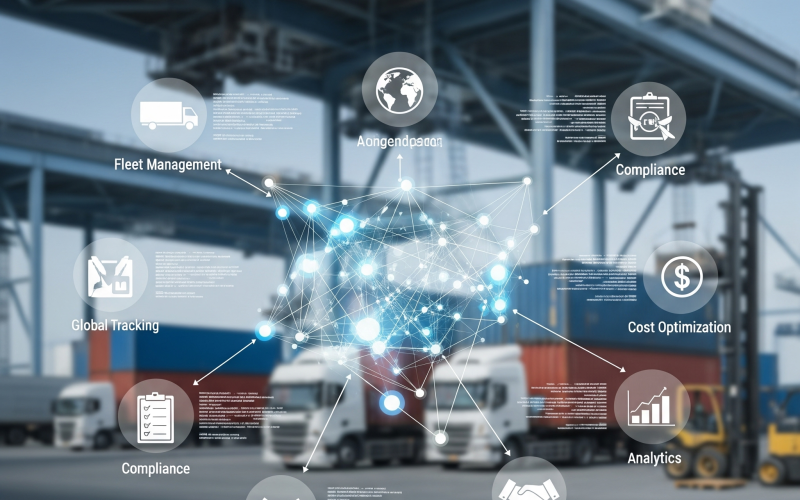Introduction
In industries where logistics and transportation are the backbone of operations, efficiency is non-negotiable. Businesses that move large volumes of goods whether manufacturers, distributors, or retailers are under constant pressure to deliver products on time, at the right cost, and with full visibility.
Managing such operations with manual methods or outdated tools often leads to delays, high expenses, and frustrated customers. This is where a Transportation Management System becomes essential. TMS systems are advanced software solutions designed to simplify planning, execution, and tracking of transportation activities. For companies managing large-scale transportation, they’re not just helpful, they’re indispensable.
In this guide, we’ll explore what makes TMS systems so crucial for large-scale operations, how they work, and the benefits they bring to businesses looking to streamline logistics.
Understanding a Transportation Management System (TMS)
A Transportation Management System is software that helps businesses plan, execute, and optimize the physical movement of goods. It provides a centralized platform to manage shipments, select carriers, track deliveries, and analyze performance all in real time.
From planning the most efficient delivery routes to ensuring compliance with regulations, a TMS connects every part of the supply chain. It acts as the central control tower for transportation, ensuring smooth coordination among shippers, carriers, drivers, and customers.
Why TMS Systems Are Essential for Large-Scale Transportation
1. Centralized Control of Complex Operations
Managing large fleets, multiple carriers, and thousands of shipments is nearly impossible without a unified system. TMS software provides a single dashboard where all transportation activities are monitored.
- Businesses can plan routes, assign carriers, and check shipment statuses in one place.
- Managers gain real-time visibility over ongoing operations, helping them spot bottlenecks early.
Benefit: Eliminates confusion, reduces manual work, and ensures smoother coordination.
2. Cost Optimization Through Smarter Decisions
Transportation is one of the largest expenses in logistics. Without proper planning, costs can spiral out of control. A TMS uses data driven insights to minimize costs by:
- Selecting the most cost-effective carriers.
- Optimizing routes to save fuel and time.
- Consolidating shipments to reduce empty miles.
Benefit: Lower operational expenses and improved profitability without compromising service quality.
3. Real-Time Tracking and Visibility
For businesses moving goods at scale, knowing where shipments are at any moment is critical. A TMS provides real-time tracking that allows managers and customers to monitor progress.
- GPS integration shows exact vehicle locations.
- Automated alerts notify teams about delays, route deviations, or potential disruptions.
Benefit: Greater transparency, fewer delays, and proactive problem solving.
4. Improved Customer Satisfaction
In today’s competitive market, customers expect timely deliveries and clear communication. A TMS ensures:
- Accurate delivery timelines.
- Automated notifications about shipment status.
- Faster resolution of delivery related queries.
Benefit: Improved trust, stronger relationships, and higher customer retention.
5. Automation of Manual Processes
Manual transportation planning requires endless spreadsheets, phone calls, and emails. A TMS automates tasks such as:
- Carrier selection.
- Shipment scheduling.
- Document generation (bills of lading, invoices, compliance papers).
Benefit: Saves time, reduces human errors, and frees staff to focus on strategic tasks.
6. Scalability for Growing Businesses
As a company expands, the volume and complexity of its transportation needs also grow. TMS systems are built to scale effortlessly.
- Whether handling 100 or 10,000 shipments, the software adapts without requiring major changes.
- New carriers, regions, and transportation modes can be added seamlessly.
Benefit: Businesses can expand without worrying about operational inefficiencies.
7. Data-Driven Insights and Analytics
A TMS doesn’t just manage transportation it continuously collects and analyzes performance data. This helps businesses identify patterns, measure KPIs, and make smarter decisions.
- Reports highlight delivery performance, carrier efficiency, and cost breakdowns.
- Predictive analytics forecast future needs based on demand trends.
Benefit: Stronger planning, reduced risks, and a more resilient supply chain.
8. Compliance and Risk Management
Large-scale transportation involves multiple regulations, from safety standards to documentation requirements. A TMS helps ensure compliance by:
- Automatically generating required documents.
- Tracking driver hours and vehicle maintenance schedules.
- Monitoring safety and regulatory updates.
Benefit: Reduced legal risks and smoother audits.
Real-World Applications of TMS in Large-Scale Transportation
Businesses across sectors rely on TMS for handling logistics more effectively:
- Retail & E-commerce: Faster last mile deliveries and better order tracking.
- Manufacturing: Streamlined raw material transport and just-in-time delivery.
- Distributors & Wholesalers: Optimized routes for bulk shipments across regions.
- 3PL Companies: Better visibility and service for multiple clients simultaneously.
Regardless of the industry, the core advantage remains the same greater control and efficiency in transportation management.
Future of TMS Systems
As technology evolves, TMS platforms are becoming smarter and more integrated. Some trends shaping the future include:
- AI and Machine Learning: Smarter route optimization and demand forecasting.
- IoT Integration: Real time monitoring of vehicle health and cargo conditions.
- Sustainability Tools: Features that calculate carbon emissions and suggest eco-friendly routes.
These advancements will make TMS systems even more vital for large-scale transportation in the years ahead.
Final Thoughts
For businesses managing large-scale transportation, relying on spreadsheets or outdated methods is no longer practical. The complexities of modern logistics require a smarter, centralized, and scalable solution and that’s exactly what a Transportation Management System delivers.
By providing real-time visibility, reducing costs, automating workflows, and boosting customer satisfaction, TMS systems transform transportation from a challenge into a competitive advantage.
If your business is scaling and transportation is becoming harder to manage, a TMS is not just an option it’s a necessity.










